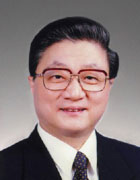Non-transparency in China
If there's an award for lack of transparency in a regime, Putin's Russia has strong competition from Hu's China. The "guessers" about Russia have been called Kremlinologists. The "guessers" about China are called China Watchers (probably because Zhongnanhaiologists has too many vowels and too many syllables). (Satellite images of Zhongnanhai.)I'd have my students read this article from the Washington Post, catalog the speculated reasons for Huang's absence, and catalog the sources that China Watchers used as a basis for their speculations. Then I'd ask them to evaluate the advantages and disadvantages of such a non-transparent system, hypothesize about why there is such pressure for more transparency, and where the pressure comes from.
Chinese Official Reappears, but Mystery Persists
"Long-Absent Vice Premier Has Key Roles
"BEIJING, June 7 -- Suddenly Huang Ju was back... sitting alongside other members of the Chinese Communist Party's supreme policymaking body, the Politburo's nine-member Standing Committee.

"Huang's return, which was broadcast on official television Monday evening and reported prominently in the next day's People's Daily, came after five months during which he had dropped from sight, generating a swirl of rumors, reports and more or less informed speculation about what had happened to one of China's most powerful men.
"Huang's reemergence settled nothing about his status... But it dramatically illustrated the secrecy behind which China's leaders work, a dark cloak that hides even the most mundane details about how they rule the world's most populous nation...
"The curiosity surrounding Huang was more than idle. For one thing, Huang, a vice premier, has been the party's overseer of economic reforms, vital to foreign investors and further modernization. Moreover, his seat on the Standing Committee, Chinese and foreign analysts pointed out, is key to President Hu Jintao's attempts to solidify his party leadership before the 17th party congress scheduled for October 2007.
"Huang, they noted, belongs to the so-called Shanghai Faction left behind by former president and party leader Jiang Zemin. Hu took over from Jiang as party leader in 2002 and as president the following year, but he has yet to push out all of Jiang's proteges and replace them with his own favorites. A recent attempt by Hu to appoint a loyalist as Shanghai's party secretary fell through, suggesting that Jiang's faction retains a measure of power, a veteran Western diplomat said.
"So when Huang dropped out of sight in January without explanation, people started asking questions. They got no authoritative answers, however, because that is not the way China's government works...
"The official media reported in April, and again in May, that Huang had sent messages to conferences that he normally would have attended. But nothing came down on his personal situation...
"Without information, Beijing buzzed with rumors. Journalists talked about Huang's absence over lunch. Officials confided their theories to one another. An elderly couple said their friends were even discussing it during early morning exercises in the courtyard of their Beijing apartment block.
"The most believable rumor said Huang, 67, had received a diagnosis of pancreatic cancer and was undergoing therapy. This version received added credibility when a spokesman for the National Committee of the Chinese People's Political Consultative Conference said March 2 that 'Comrade Huang Ju was hospitalized for treatment because he was unwell. He is currently recovering.'
"But other versions circulated as well. One said that Huang's wife, Yu Huiwen, was in police custody being investigated for financial irregularities and that Huang had been asked to step aside pending the investigation. Other reports said that Huang himself was under suspicion and that police were interrogating him as well as Yu.
"More recently, a mid-level official said he was told, in great detail, that Huang was indirectly involved in a security leak to Taiwan and was being extensively interrogated by national security officials at a government facility in the Beijing suburbs.
"Huang's daughter, the official said, had a long-standing relationship with a Taiwanese businessman whose father has ties to the pro-independence Democratic Progressive Party of Taiwanese President Chen Shui-bian. Suspicions were aroused that the relationship might have become a conduit for state secrets through carelessness or espionage, he said. Hu and his lieutenants were particularly concerned, the official said he was told, because Chinese intelligence learned that the content of a Standing Committee meeting on Taiwan policy was passed to Chen within days of its being held.
"Sorting out the reports was impossible, even for relatively well-informed Chinese. Many informed people bought into the cancer theory, particularly after the spokesman's comment in March, but they were far from sure and did not know how authoritative it was...
"Huang appeared pale but steady during his brief appearance on China Central Television. He was shown attending a conference of scientists and engineers, sitting alongside other Standing Committee members...
"The People's Daily, the party organ, mentioned Huang on page one in his order of seniority with the other Standing Committee members. But the only photo showed Hu, prominent against a bright orange background under a bold headline saying he had delivered "an important speech" to the gathered scientists."



0 Comments:
Post a Comment
<< Home